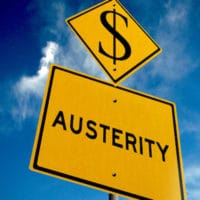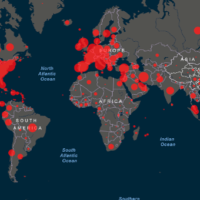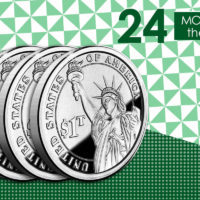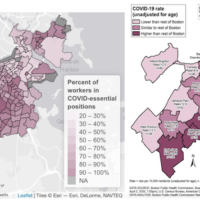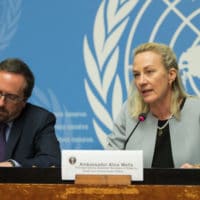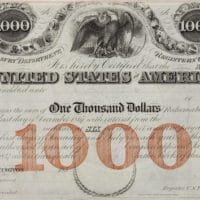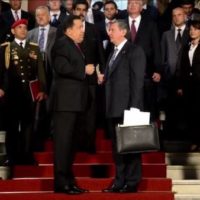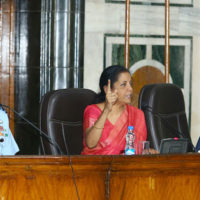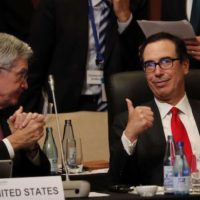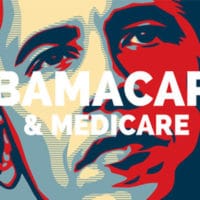-
Avoid austerity to prevent a state and local coronavirus depression
Local budget cuts enacted a decade ago left states and cities dangerously unprepared for COVID-19. We shouldn’t make those same mistakes again.
-
Marx in the era of pandemic capitalism
How could Karl Marx (1818–1883) help us interpret the current crisis? His theory of history offers critical resources to interpret the unprecedented crisis which is shaking the world today, while indicating at the same time that ‘the world after’ so much mentioned could only be anti-capitalist.
-
#MintTheCoin & COVID Relief with the Modern Money Network
Rohan Grey and Nathan Tankus join Money on the Left to discuss the flurry of debate about Modern Monetary Theory (MMT) arising out of the Coronavirus crisis. We focus, in particular, on the Modern Money Network’s multi-pronged efforts to illuminate and remedy the resulting economic devastation. At the center of our conversation is Rohan’s contribution […]
-
Data show COVID-19 is hitting essential workers and people of color hardest
Newly released data from the Boston Public Health Commission (BPHC) show that COVID-19 is present at higher rates in certain Boston communities, including Hyde Park, Mattapan, Dorchester, and East Boston.
-
Don’t threaten Afghans—it will be counterproductive
The principal deputy assistant secretary at the Bureau of South and Central Asian Affairs (SCA) in the U.S. State Department, Alice Wells, dropped a bombshell on the Afghan government and the country’s political elites on April 4—and caught the international donors by surprise, too—by linking all aid to Afghanistan to the formation of an inclusive government in Kabul.
-
The Federal Reserve’s Coronavirus Crisis Actions, explained (Part 4)
Ten days after the last central bank swap line announcement, the Federal Reserve followed up with an announcement of another facility meant to help a lower tier of central banks. In this facility the Federal Reserve would make a standing offer to temporarily purchase U.S. treasury securities from central banks (and supranational monetary institutions) and sell them back to them the following day.
-
University workers must not accept wage cuts in exchange for ‘job security’
The government, university bosses and national officials of the National Tertiary Education Union are combining to attack uni workers’ pay and conditions.
-
Stanch the bleeding from local and state finances with local currencies
At the risk of making it seem like central bank swap lines are the solution to every problem, a swap line for local and state governments is the perfect tool using the Federal Reserve’s existing legal authority and can facilitate supporting these local currencies.
-
A Russian firewall for Venezuela against U.S. sanctions
The optics of the Russian oil leviathan Rosneft’s decision to sell its subsidiary Rosneft Trading SA and sell all its assets in Venezuela after the US Treasury sanctioned its trading arm two weeks ago as part of Washington’s regime change project to oust president Nicolás Maduro, may not look good to the uninformed outside observer.
-
The Coronavirus depression requires a new approach to budgeting
Congress recently passed a 1.5-1.7 Trillion dollar stimulus bill (as I wrote about last week, the reported headline number is including a useless accounting gimmick which provides no additional support to the U.S. economy). Part of the reason we can report such an exact number is congress budgets in exacts.Take a look at these two sections of the CARES Act, picked at random.
-
Corona and what then?
Berlin, like many of your hometowns, is a ghost city. Except for those offering groceries, medicines or medical care, everything is shut tight. Luckily, no-one here has to stay inside, we can stroll around outside but, aside from families, we may not “assemble” in groups of more than two (if any cops are around).
-
A niggardly response to an extraordinary crisis
In a show of solidarity, some of India’s opposition leaders have declared the much-delayed relief package (titled Pradhan Mantri Garib Kalyan Yojana) announced by Finance Minister Nirmala Sitharaman on March 26 to mitigate the effects of the Coronavirus pandemic on the poor as a welcome “first step”.
-
The Federal Reserve’s Coronavirus crisis actions, explained (Part 2)
Hear comes the corporate debt purchases.
-
The Federal Reserve’s Coronavirus crisis actions, explained (Part 1)
The Federal Reserve has taken an extraordinary amount of actions over the past two weeks (most of which have happened over the course of 8 days from March 15th to March 23rd) to calm financial markets and sustain the flow of credit to households and businesses to respond to the coming Coronavirus-induced depression.
-
With the public distracted, Interior Department moves full speed ahead on oil and gas leases
We are currently in a state of national emergency thanks in no small part to the Trump administration’s muzzling of public health experts and slow response to the COVID-19 pandemic.
-
Chelsea Manning supporters raise a Quarter Million dollars in two days
In the likely event that you need some news to give you a bit of faith in humanity today, you should know that supporters of whistleblower Chelsea Manning have raised over a quarter million dollars to pay the cruel, draconian fine that was heaped upon her for her principled stand against testifying at corrupt secret grand jury proceedings.
-
Government austerity is costing lives in the fight to contain Covid-19
I am old enough to remember that shortly after the 1968 election of Richard Nixon to the presidency, his campaign manager (and future U.S. Attorney General) John Mitchell said, “Watch what we do not what we say.”
-
Big banks call for Wall Street deregulation to “fight Coronavirus”
As Naomi Klein laid out in her bestseller “Shock Doctrine,” the wealthy elite use the confusion caused by economic and other disasters to quickly force through pro-free-market legislation.
-
Obamacare with a public option: fool me twice shame on me
There is an old saying “Fool me once shame on you, fool me twice shame on me.” That saying is relevant for the current healthcare debate in which former Vice-President Biden and elite Democrats are touting a reheated version of Obamacare with a public option. It is a case of trying to fool the American public twice.
-
No, the coronavirus is not responsible for the fall of stock prices
We are witnessing a big crisis in the stock markets of the Wall Street, Europe, Japan and Shanghai, and many blame the coronavirus for it. In the last week of February 2020, the worst week since October 2008, the Dow Jones fell 12.4%, the S&P 500 fell 11.5% and the Nasdaq Composite fell 10.5%.

